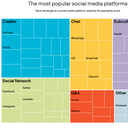Social media giants try to lean into the creator economy

Amid the sea of pollution on social media, another class of apps is soaring in popularity: The creators are paid, putting a premium on talent instead of just noise.
The big picture: Creator-economy platforms like Patreon, Substack and OnlyFans are built around content makers who are paid. It's a contrast to platforms like Facebook that are mostly powered by everyday users’ unpaid posts and interactions.
Driving the news:
- Facebook-owned Instagram on Monday unveiled a new analytics dashboard for creators. That follows the summer launch of Instagram's creator platform, "Reels," a direct competitor to TikTok, which rides on an algorithm that can deliver big audiences and cash to content creators.
- On Wednesday, Facebook COO Sheryl Sandberg told investors that Reels has now been introduced in over 50 countries, and that the company is in the early stages of figuring out monetization around it.
- Twitter said Tuesday it bought a newsletter platform that caters to writers. The New York Times reported Thursday that Facebook is developing a similar product of its own. Twitter also recently introduced "Fleets," a take on Snapchat-style stories that could help creators build monetizable audiences.
Even YouTube, which was the first major social platform to cater to creator economics, says one of its biggest priorities this year is to lean much more heavily into that trend.
- CEO Susan Wojcicki wrote in a letter that YouTube has paid more than $30 billion to content creators, artists and media firms in the last three years. YouTube has started to expand its TikTok rival "Shorts," following a successful beta test in India.
Be smart: New data from the Knight Institute shows that the creator-economy apps are commanding much more user interest than traditional social media. (See our chart above.)
By the numbers: Nearly every major app geared toward content creators saw significant increases in downloads during the pandemic, according to data from Apptopia.
- TikTok parent ByteDance's revenue more than doubled in 2020 to about $37 billion, quadrupling in the past two years, The Information reported Tuesday.
- Cameo, which lets fans pay for personalized videos from celebrities, brought in roughly $100 million in video transactions last year.
- Patreon is now valued at $1.2 billion, and is preparing to go public this year.
The catch: Big Tech's regulatory woes might constrain its ability to quickly pivot to new business models.
- Democrats, in light of the role social platforms played in the Capitol siege, are more motivated to regulate tech than ever. Conservatives are furious at tech over perceived censorship. And regulators in Europe, Australia and elsewhere are circling.
- Recall Microsoft's regulatory troubles in the '90s and early 2000s, which weighed on the company's ability to evolve its products. That paved the way for Google and other then-insurgent firms to own the next phase of the tech revolution.
Between the lines: Tech companies are trying to take the heat off themselves by getting more transparent about how their platforms and moderation practices work, and by offloading some contentious calls to outside parties.
- Facebook handed political ad data over to researchers and for the first time revealed exactly how its algorithm works. Twitter did something similar Tuesday.
- Facebook kicked its ban of former President Trump to its new independent oversight board for review, while Twitter just unveiled a new content moderation program that would enlist users to add context to tweets they believe are misleading.
What to watch: Leaning into the creator economy could also be a key to dimming political scrutiny, letting firms like Facebook spotlight creativity and downplay partisan news and politics.
- Facebook said Wednesday it is pushing to reduce politics on its platform.
Yes, but: For now, creator-economy upstarts are still tomorrow's threats. Facebook beat Wall Street's top- and bottom-line projections in a Wednesday earnings report, and analysts expect other tech firms to crush fourth-quarter earnings as they continue to announce them in the coming days.